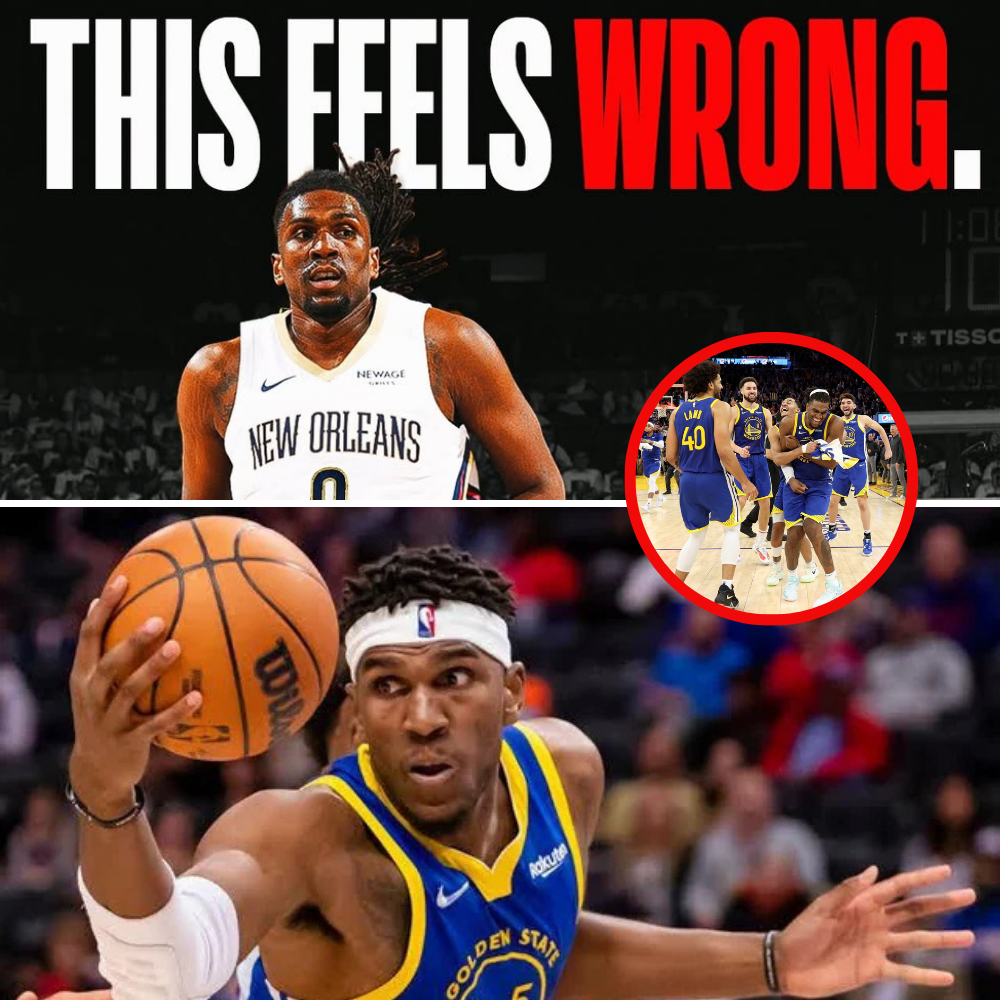
For a decade, Kevon Looney has been the beating heart of the Golden State Warriors, a franchise synonymous with dazzling three-pointers, star power, and championship parades. Yet, behind the spotlight cast on Stephen Curry’s long-range wizardry, Draymond Green’s fiery leadership, and Klay Thompson’s sharpshooting, Looney’s quiet, relentless contributions have often gone unnoticed. Ten years. Three NBA championships. Countless screens that freed up superstars. A rebellion against doubt and injury. Never a complaint. Looney embodies the soul of a dynasty, but the recognition he receives—or lack thereof—tells a story of heartbreak that resonates far beyond the hardwood.
Born in Milwaukee, Wisconsin, on February 6, 1996, Looney grew up in a basketball-loving family. Coached by his father, Doug, a rebounding legend at Schreiner University, and inspired by his older brother Kevin’s pickup games, Looney honed his craft early. A Kobe Bryant fan, he studied the Lakers icon’s moves but was conditioned to prioritize rebounding over scoring—a mindset that would define his career. By his senior year at Hamilton High School, Looney was Wisconsin’s top player, a five-star prospect, and an All-American. His journey led him to UCLA, where he led all freshmen nationally in double-doubles, showcasing his tenacity despite concerns about his hips.
Selected 30th overall by the Warriors in the 2015 NBA Draft, Looney’s entry into the league was marred by skepticism. Rumors swirled about hip surgeries that could derail his career, and some scouts questioned his intensity. The Warriors, fresh off their 2015 championship, saw potential in the 6-foot-9 forward. They were patient, a luxury afforded by their star-studded roster. Looney’s early years were a battle against his body. A strained left hip sidelined him for most of the 2016 playoffs, and two hip surgeries tested his resolve. Yet, he persevered, embodying the grit that would become his hallmark.
By the 2017–18 season, Looney emerged as a reliable rotation player, often playing as an undersized center. His role was unglamorous but critical: set bone-crushing screens, grab offensive rebounds, and defend anyone from Anthony Davis to James Harden. In the 2018 Western Conference Finals, he stepped into the starting lineup after Andre Iguodala’s injury, holding his own against Houston’s guards. The Warriors swept Cleveland for their second straight title, and Looney’s contributions, though subtle, were undeniable. He was the steady hand in a high-octane machine, the player who did the dirty work while others soaked up the glory.
The 2022 season was Looney’s pinnacle. Starting at center, he dominated the glass, particularly in the Western Conference Finals against Dallas. In Game 2, he erupted for a career-high 21 points and 12 rebounds, earning “MVP” chants from the Chase Center crowd. His 18 rebounds in Game 5, including seven offensive, helped clinch the series. Looney’s rebounding prowess joined him with Warriors legends Wilt Chamberlain and Nate Thurmond, the only players in franchise history with multiple 20-rebound playoff games in a series. The Warriors defeated Boston in six games, securing Looney’s third championship. His averages of 7.5 rebounds and 5.0 points belied his impact as a defensive anchor and screen-setting maestro.

Looney’s screens are the stuff of legend. Ranking in the top five league-wide for off-ball screens per 100 possessions, he has freed Curry and Thompson for countless open shots. His ability to read defenses and make short-roll passes in pick-and-roll actions mirrors Draymond Green’s playmaking. Against Sacramento in the 2023 playoffs, Looney’s 13 offensive rebounds in a single quarter set an NBA playoff record, turning a tight game into a Warriors rout. His physicality wore down opponents, creating second-chance opportunities that fueled Golden State’s offense.
Yet, Looney’s rebellion against adversity is perhaps his defining trait. From hip surgeries that nearly ended his career to doubts about his NBA fit, he has defied expectations. His streak of 290 consecutive games played, ending in March 2024, was a testament to his durability and commitment. Even when rookie Trayce Jackson-Davis supplanted him in the starting lineup in 2023–24, Looney never complained. He embraced his role, averaging 4.5 points and 6.1 rebounds off the bench, and continued to mentor younger players. His teammates call him the “moral compass,” a leader who keeps the Warriors grounded amid the chaos of egos and expectations.
Off the court, Looney’s impact is equally profound. A youth basketball instructor and peer tutor in Milwaukee, he has remained connected to his roots. His engagement announcement in 2024 drew heartfelt congratulations from teammates, reflecting his status as a beloved figure. Looney’s humility shines through in moments like his first three-pointer since 2021, a shot drawn up by coach Steve Kerr in a 2025 blowout against San Antonio. His grin and refusal to bask in the moment—“I wanted to act like I’ve been there before”—captured his understated charm.
But here lies the heartbreak. Despite his contributions, Looney’s legacy is often overshadowed. Fans and media gravitate toward the flash of Curry’s 50-point games or Green’s outspoken leadership. Looney’s No. 5 jersey, occasionally spotted in the crowd, competes with those of Baron Davis or Marreese Speights. His $8 million contract for 2024–25, only $3 million guaranteed, sparked speculation about his future. When the Warriors fully guaranteed it, it was a nod to his value, yet rumors persisted of a possible trade. In June 2025, reports surfaced of a two-year, $16 million deal with the New Orleans Pelicans, signaling the end of his Warriors tenure after a decade.
The lack of recognition stings. Looney’s name rarely appears in All-Defensive Team discussions, despite his versatility. He has no All-Star nods, no individual awards. Social media buzz, like posts celebrating his engagement or rare three-pointers, fades quickly. A Reddit thread with 401 votes lamented his reduced role in 2025, calling him a “foundational pillar” of the dynasty, yet such praise is fleeting. The Warriors’ pursuit of cost-cutting and youth has pushed Looney to the margins, a painful reality for a player who embodies their ethos of team-first basketball.
Looney’s story is one of sacrifice. He could have chased a bigger role elsewhere but stayed loyal to Golden State, accepting smaller minutes and contracts. His rebounding, once compared to Dennis Rodman’s by fans, and his screens, likened to an art form, have been integral to four championship runs. Yet, as the Warriors chase another title in 2025, Looney’s departure feels like the closing of an era. The franchise’s stars—Curry, Green—will have statues, but Looney dreams only of a jersey in the rafters, a modest hope for a player of his impact.
What does the future hold? In New Orleans, Looney could thrive alongside Zion Williamson, setting screens and grabbing boards. But his heart remains in Golden State, where he became a champion and a symbol of resilience. The NBA may overlook him, but those who understand the game—teammates, coaches, diehard fans—know his worth. As Looney himself said, reflecting on his 10-year journey, “I had to have faith in myself.” That faith carried him through surgeries, doubts, and a decade of unsung heroism. The world may not give him the accolades he deserves, but Kevon Looney’s legacy is etched in the soul of a dynasty, a quiet rebellion against a game that too often forgets its truest warriors.


